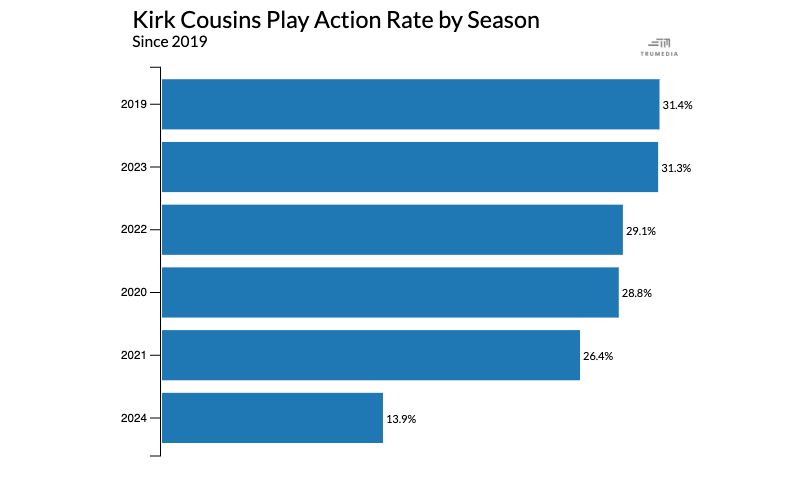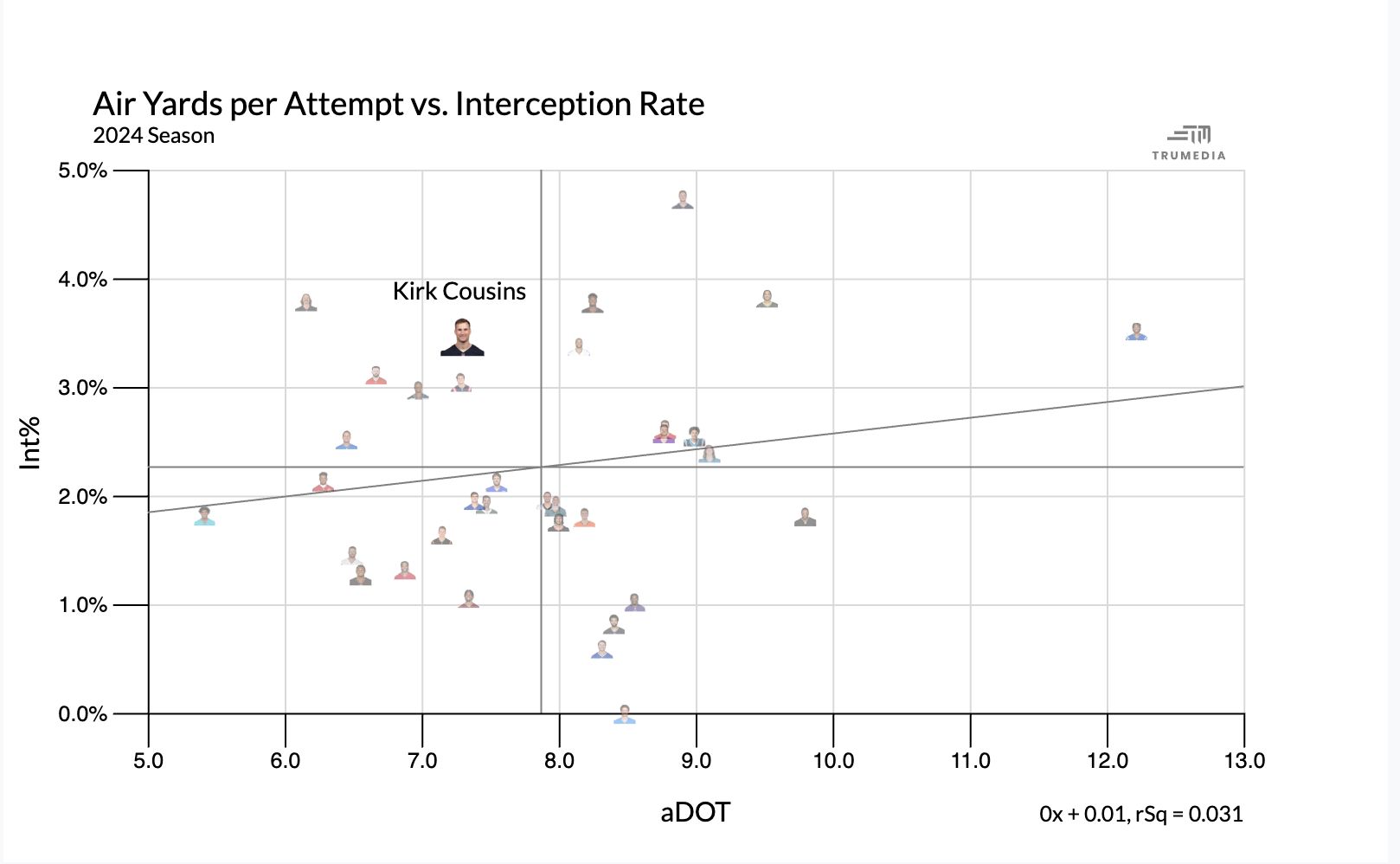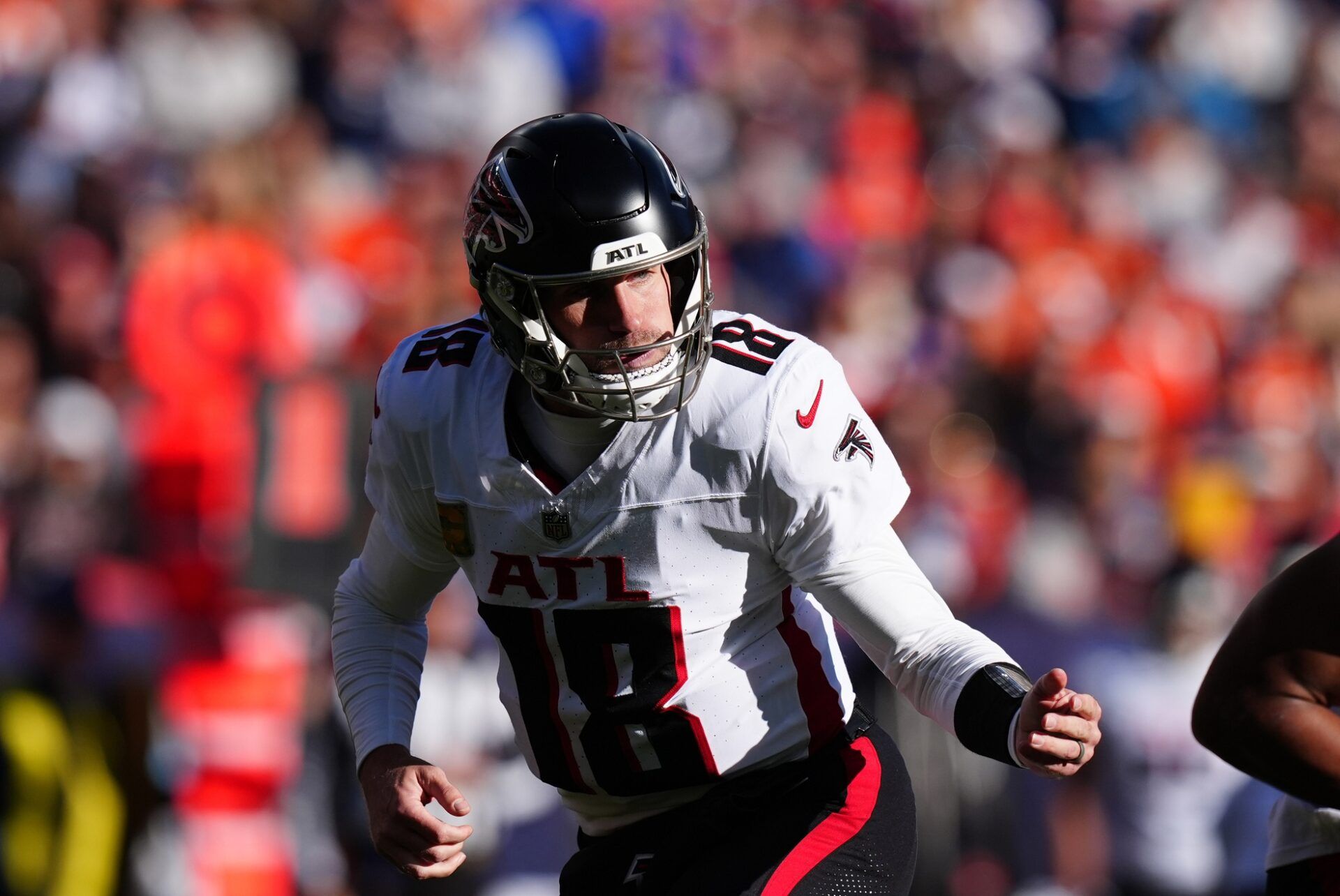The Atlanta Falcons made one of the biggest quarterback splashes of this past offseason, inking Kirk Cousins to a four-year, $180 million contract. That move appeared wise when the Falcons were 6-3 and cruising towards their first playoff appearance since 2017.
But after four losses in five games, Atlanta is no longer in the driver’s seat for the NFC South. Worse, the franchise is facing real questions at the QB position.

What Happened to Kirk Cousins?
Last 5 Games Are Out of a Different Era
By now, everyone has seen that before their win over the Raiders, Cousins had thrown zero touchdowns and eight interceptions during the team’s four-game losing streak. Yes, that changed in Week 15, but not by much. Cousins only threw one TD, and the Falcons kicker did the rest.
It’s almost impossible for a quarterback to put up those kinds of numbers in the modern passing environment. It’s only happened to three other QBs this century, and all occurred more than 15 years ago:
- 2005-06 Ben Roethlisberger: Between the end of his second season and the start of his third, young Big Ben threw no touchdowns and nine picks over a four-game span. But this stretch came five years before his first Pro Bowl appearance, and the start of his 2006 season was marred by a serious offseason motorcycle crash and appendicitis that caused him to miss the season opener.
- 2005 Brett Favre: This looked like the end for Favre, who threw a career-worst 29 interceptions for a woeful 4-12 Green Bay Packers team. This stretch came at the end of that lost year from Weeks 13-16.
- 2005 Alex Smith: One of the worst statistical rookie seasons ever, Smith actually had two different stretches that fit this criteria. The first overall pick ended up throwing one touchdown and 11 interceptions for a 4-12 San Francisco 49ers team.
Cousins is no longer playing in an era where the Rex Grossman-led Chicago Bears can reach the Super Bowl, making his 2024 stretch far more damaging. As PFN’s Ben Rolfe noted in the latest QB+ rankings, Cousins ranks 32nd in the metric over his four-week slump, ahead of only Drew Lock. Overall, Cousins is 23rd out of 40 qualified QBs this season, with a lot of that ranking weighted to early season success.
Kirk Cousins’ Biggest Weapon Is No Longer Accessible
For years, Cousins was one of the best play-action quarterbacks. From 2019-23 (the first year TruMedia has play-action data available), Cousins ranked second in play-action passer rating (115.0), behind only Drew Brees (126.1). In that same span, his 61 passing touchdowns off play-action ranked second behind Josh Allen (65).
The Minnesota Vikings were able to fully lean into that strength, using play-action at the fourth-highest rate of any team from 2019-23. But in the wake of Cousins’ Achilles injury, the Falcons now rank last in play-action usage.

Cousins was never anything special off non-play-action dropbacks and actually hasn’t seen a huge decline there. He posted a 96.1 passer rating without play-action from 2019-23. This year, that’s only dipped to 92.3.
So Cousins was performing at roughly the same level on regular dropbacks as he did with the Vikings. However, the dropback type that allowed him to thrive has seen its usage cut in half.
There Aren’t Enough Big Plays
Relatedly, Cousins hasn’t been able to generate enough downfield explosive plays to offset his lack of mobility and ball security. Of 34 qualifiers, through 15 weeks, Cousins ranks 26th in deep pass interception rate — one of the names he ranks ahead was another casualty of depth chart changes this week in Jameis Winston. His 5.8% touchdown rate on such passes is the lowest of his career, meaning that he’s been occurring all risk and no real reward on those throws.
In starting a veteran over a rookie, the idea is that you get poise, but that hasn’t been the case. Cousins has thrown 10 interceptions on 126 pressured attempts this season — over the three years prior, he had seven picks across 231 such attempts.
As you’d expect, quarterbacks who throw the ball shorter typically also have lower interception rates since they’re attempting less risky passes. Unfortunately for the Falcons, Cousins falls into the quadrant of passers who keep it short AND have trouble protecting the ball, which is the worst place to be.

Other turnover-prone passers, such as Jordan Love and Sam Darnold, have offset their turnover woes this season with more downfield success.
This is potentially where Penix’s skill set can come into play. Penix was known for his downfield success at Washington — the first strength listed in his draft profile from PFN’s Ian Cummings states “Rocket-armed left-handed thrower with elite drive velocity and high-end arm elasticity.”
How Has Cousins Fared In His First Season With the Falcons?
After signing a four-year, $180 million contract with the Falcons in March 2024, Cousins was expected to produce like one of the NFL’s top quarterbacks. After all, he’s the 12th-highest-paid QB in the NFL (tied with Patrick Mahomes).
However, Cousins has disappointed this season, particularly over the last month. Cousins leads all quarterbacks in interceptions with 16, and he has thrown just 18 touchdowns this season. In the four games (all losses) prior to Monday night, Cousins had thrown for zero touchdowns and eight interceptions.
In PFN’s QB+ metric, Cousins is the 23rd-ranked quarterback on the season. During the 4-game losing skid, he ranked 32nd. The only quarterback who had been worse than Cousins over that stretch is New York Giants QB Drew Lock.
PFN’s QB+ metric is a formula that we created to assign a letter grade to every quarterback’s performance. We factor in a number of stats, including success rates when pressured, third-down conversion rate, and pocket production. The added wrinkle in this PFN Insight is quantifying “clutch.” Defining “clutch” performance is an imperfect science, but we use timeliness-based stats to account for score and situation.
The 36-year-old seems to be falling apart as opposed to turning it on in the second half of his first season in Atlanta. We have reached the point where people are questioning whether he needs to be benched for No. 8 overall pick Michael Penix Jr.
Cousins’ statistics for the season are not terrible, with the first half of the season having been fine. He ranks 17th in EPA per dropback at 0.07 and 25th in third-down conversion rate (34.7%). He actually ranks 10th in nYPA (7.4), thanks in part to 5.6 YAC/Cp, which ranks 11th. He is slightly worse when operating under pressure relative to where he ranks from a clean pocket, but not significantly so.
But given what he was paid and the fact that Atlanta entered this season with Super Bowl aspirations, he has been a huge disappointment.
Pigeonholes Falcons Into Tough Offseason Spot
Benching Cousins would represent a point of no return. The franchise has already had a lingering awkwardness from Cousins’ shock at Atlanta using the No. 8 overall pick on Penix in the 2024 NFL Draft. Removing him from the starting lineup would likely lead to a trade or release request and a full commitment to Penix.
The problem is that this isn’t a clean break, a la the New York Giants moving on from Daniel Jones with no guaranteed money left. Per Spotrac, Cousins’ $27.5 million salary for 2025 is fully guaranteed. The Falcons would incur $65 million in dead money by trading or releasing him without a post-June 1 designation, which would be the largest in NFL history.
Atlanta could theoretically spread the cap hit over two years, taking a $40 million hit in 2025 and a $25 million hit in 2026. Neither option is desirable and would disarm Atlanta’s ability to build around Penix’s cheap rookie deal.

